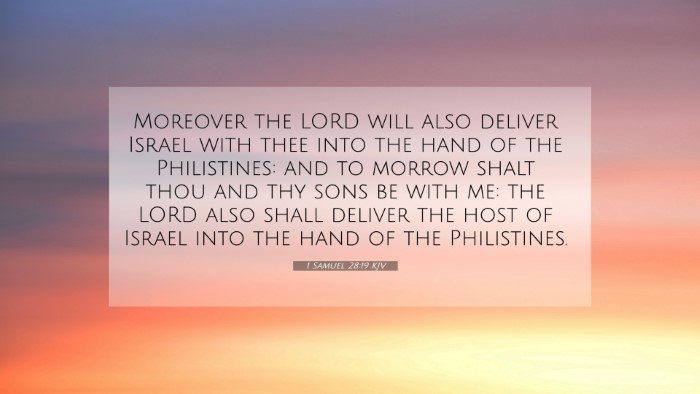Understanding 1 Samuel 28:19
Verse: "Moreover, the Lord will deliver Israel with you into the hand of the Philistines: and to morrow shall thou and thy sons be with me: the Lord also shall deliver the host of Israel into the hand of the Philistines."
This verse stems from a crucial moment in the narrative of Saul's life, where he seeks guidance from the spirit of the deceased prophet Samuel. The verse delivers a heavy message regarding Saul's impending doom and the fate that awaits Israel. Below, we will explore some insightful interpretations from various public domain commentaries.
Matthew Henry's Commentary
Matthew Henry emphasizes the profound tragedy within this verse, noting that Saul, once chosen and blessed by God, now faces divine judgment. Saul's seeking of the dead reflects his desperation and spiritual decline. Henry points out the irony that Saul, who had eliminated the mediums, resorted to one in a time of crisis, indicating his departure from faith in God. The result of his actions results in not only his downfall but also that of his sons.
Albert Barnes' Notes
Albert Barnes provides a detailed breakdown of the implications of this prophecy. He highlights that the Lord indeed takes the reins in guiding the political and spiritual destiny of Israel. The mention of Saul's sons signifies the complete collapse of his lineage and leadership. Barnes connects this event to the earlier warnings given to Saul when he failed to obey God's commands, indicating that Saul's choices throughout his reign led to this moment of prophetic realization.
Adam Clarke's Commentary
Adam Clarke approaches this verse with a focus on the concept of divine sovereignty and judgment. He explains that the direct deliverance of Israel into the hands of their enemies signifies God's withdrawal of protection due to Saul's disobedience. Clarke also draws parallels between this event and other scriptural accounts of judgment, reinforcing the theme that rebellion against God leads to severe consequences. Furthermore, he discusses the implications for Israel, noting that Saul's failure would lead to hardships for the entire nation.
Key Themes and Insights
- Divine Judgment: The verse highlights God's providential judgment over leaders who disobey Him.
- Desperation and Spiritual Decline: Saul's turn to necromancy illustrates a deeper spiritual crisis.
- Family Consequences: The prediction of Saul and his sons' death reflects the generational impacts of leadership failure.
- Lesson on Obedience: Saul's story serves as a cautionary tale about the importance of adhering to God's commandments.
Bible Cross-References
This verse can be cross-referenced with several other scriptures that illuminate its themes:
- 1 Samuel 15:23 - "For rebellion is as the sin of witchcraft..." - Highlights the consequences of disobedience.
- 2 Samuel 1:10 - Saul's death is confirmed and mourned, emphasizing the fulfillment of prophecy.
- Jeremiah 14:10 - God's disapproval leading to judgment mirrors the fate awaiting Saul and Israel.
- Job 36:12 - "But if they do not listen, they perish by the sword..." - Illustrates consequences of ignoring divine warnings.
- 1 Chronicles 10:13-14 - Provides additional details of Saul's failures and God's abandonment.
- Galatians 6:7 - "A man reaps what he sows..." - The principle of divine justice relates to Saul's leadership.
- Luke 16:26 - Discusses separation from God reflecting Saul's incoming judgment.
Connecting Themes Across Scripture
This passage opens an inter-Biblical dialogue regarding the importance of faithfulness to God, the danger of despair leading to poor decisions, and the consequences of turning away from divine guidance. The thematic connections between Saul's actions and other Biblical narratives are critical for understanding the consequences of disobedience.
Summary of Insights
In summary, 1 Samuel 28:19 serves as a profound reminder of God's sovereignty and the consequences of straying from His path. The interconnectedness of scripture calls for a reflective study to fully grasp the depth of its message. By examining the cross-references and their meanings, one can better understand the significance of Saul's tragic end and the lessons applicable to modern readers.
How to Use Cross-Referencing in Bible Study
For those studying the Bible, utilizing tools for Bible cross-referencing can enhance understanding. Whether through a Bible concordance, a cross-reference Bible study guide, or digital resources, these tools help in identifying connections between verses and themes. To use cross-references effectively:
- Identify Themes: Determine the themes present in the verse you are studying.
- Look for Related Verses: Use a concordance or reference system to discover scripture that shares similar themes or messages.
- Compare Interpretations: Review various commentaries to gain different perspectives on the verses.
- Reflect on Implications: Consider how these connections affect your understanding of God's nature and human behavior.
Final Thoughts
As we reflect on 1 Samuel 28:19 and its implications, we are reminded that the lessons gleaned from this passage are not just historical but are relevant for our spiritual journey today. By cross-referencing biblical texts, we deepen our understanding and appreciate the rich tapestry of scriptural truth.












